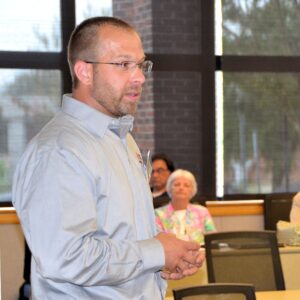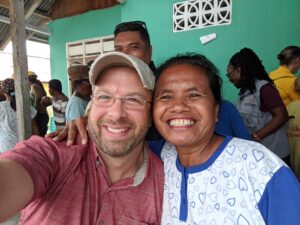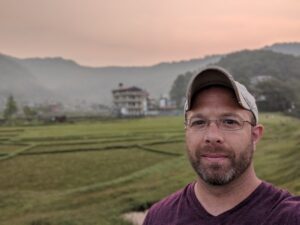I’m bouncing around in the back of a 1970’s-style Jeep while rocks are falling from the hillside above, and I’m trying not to glance at the sheer cliff below. There are no guardrails, no passing zones, just a one-way path recently cut into the side of the mountain thousands of feet above the valley floor. I’m certain that the freshly-bulldozed gravel rock ledge will give way or the consistent rain of falling rocks from above will push our jeep to its demise. Scared? You bet! But not the scariest moment I would experience on this adventure.
It’s December of 2005, and I’m in the Kashmir region of Pakistan leading a small volunteer team on a mission to support earthquake survivors. Our Jeep reaches its destination high in the mountains where a temporary Pakistani military base has been established. In customary fashion, we are led to a tent for tea and refreshments. The plan is to stay the night at base before hiking most of the following day to a remote village high in the Himalayan mountains that has never received a foreign visitor in the history of its settlement hundreds of years ago.
My team sits down in the company of Pakistani soldiers, relieved that we reached our destination. I, on the other hand, have been singled out as the group leader by the Major who oversees the camp. It turns out he was never informed that we were going to be arriving at his base. As I finish my tea, the questions start coming. “Where are you from? Who sent you? Why are you here? Are you FBI? Are you CIA?” I answer each of the questions directly, but his tone and body language does not change. Then with the same demeanor, he orders, “Come with me!” Now I’m scared. What have I got myself into?
Once outside the tent, we walk a brief distance to an overlook and the Major lets down his guard. He points out how the fields we are surveying should have been planted for the winter crop, how survivors have been psychologically impacted and how this disaster has crushed the souls of so many. He then shares how grateful he is that we would care enough to come such a great distance and that our presence and solidarity will mean more than anything we will be able to physically accomplish during our time. He invites me back to his private tent, and we spend the next two hours chatting about family and life while eating local delicacies and stepping away from the world of hurt, chaos and uncertainty that looms outside.
Looking back, I realize this was a key moment that codified the importance of relationships, of walking alongside survivors and the power of presence. The Major was right. The most important thing that my team and I accomplished was being present with him, his soldiers and the community we supported. Although we weren’t able to accomplish much “tangible work” due to supply and logistical challenges, our presence was the energy boost the community needed during this devastating situation. It is easy to minimize the power of presence simply because it is difficult to quantify or does not fit our predetermined data driven metrics but maybe that’s why we can’t quantify it: it’s invaluable!
Relationships, solidarity and presence are at the heart of CWS’ Emergency Preparedness, Response and Recovery program (EPRR). It’s not always what we do but how we do it and who we take along with us that are most important. EPRR’s strategic focus on populations of refugees, immigrants and unaccompanied children is greater than providing culturally-appropriate preparedness materials in native languages, CWS Kits and Blankets to disaster survivors or imparting technical expertise for long-term recovery efforts. It is equally a mission of presence in times of disaster. It’s about building the trust and relationships necessary to successfully help families receive support and navigate the complex aftermath of a disaster. It’s about sharing the message of solidarity and presence with other response organizations to ensure vulnerable newcomers are equitably served. It’s about walking alongside our historic partners who have lived and worked in these communities for decades. I’m proud of the focus and work of CWS’ EPRR team. Just like my relationship with the Major in Pakistan, the relationships we build in EPRR are invaluable.
Zach Wolgemuth is CWS Director of Emergency Preparedness, Response and Recovery. You can learn more about the EPRR Program by clicking here. You can donate to the CWS Emergency Response Fund here.



